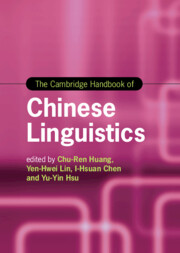Book contents
- The Cambridge Handbook of Chinese Linguistics
- Cambridge Handbooks In Language and Linguistics
- The Cambridge Handbook of Chinese Linguistics
- Copyright page
- Contents
- Figures
- Tables
- Contributors
- Acknowledgments
- Part One Writing System/Neuro-cognitive Processing of Chinese
- Part Two Morpho-lexical Issues in Chinese
- Part Three Phonetic-phonological Issues in Chinese
- 11 The Morphophonology of Chinese Affixation
- 12 Mandarin Chinese Syllable Structure and Phonological Similarity
- 13 Tonal Processes Defined as Articulatory-based Contextual Tonal Variation
- 14 Tonal Processes Defined as Tone Sandhi
- 15 Tonal Processes Conditioned by Morphosyntax
- 16 Tone and Intonation
- 17 Evidence for Stress and Metrical Structure in Chinese
- 18 Perceptual Normalization of Lexical Tones
- Part Four Syntax-semantics, Pragmatics, and Discourse Issues
- Index
- References
12 - Mandarin Chinese Syllable Structure and Phonological Similarity
Perception and Production Studies
from Part Three - Phonetic-phonological Issues in Chinese
Published online by Cambridge University Press: 04 August 2022
- The Cambridge Handbook of Chinese Linguistics
- Cambridge Handbooks In Language and Linguistics
- The Cambridge Handbook of Chinese Linguistics
- Copyright page
- Contents
- Figures
- Tables
- Contributors
- Acknowledgments
- Part One Writing System/Neuro-cognitive Processing of Chinese
- Part Two Morpho-lexical Issues in Chinese
- Part Three Phonetic-phonological Issues in Chinese
- 11 The Morphophonology of Chinese Affixation
- 12 Mandarin Chinese Syllable Structure and Phonological Similarity
- 13 Tonal Processes Defined as Articulatory-based Contextual Tonal Variation
- 14 Tonal Processes Defined as Tone Sandhi
- 15 Tonal Processes Conditioned by Morphosyntax
- 16 Tone and Intonation
- 17 Evidence for Stress and Metrical Structure in Chinese
- 18 Perceptual Normalization of Lexical Tones
- Part Four Syntax-semantics, Pragmatics, and Discourse Issues
- Index
- References
Summary
In this chapter, we discuss the Mandarin syllable and recent innovations in its study. The focus will be on the segmentation of the syllable into phonological units, an area of research that features a proposal for the combination of segments into phonological units for almost every permutation possible. At the core of the new work in this area is the combined use of network science and psycholinguistic experimentation. We review exploratory work modeling the lexicon according to phonological networks, wherein words are the nodes of the network and the networks' edges are identified through the addition deletion or substitution of a single segment or lexical tone. We argue that lexical access viewed in light of syllable segmentation modelled through phonological networks sees the lexicon as multiple concurrent networks that, when given the demands of a specific task, activate connections most fit for the goals of the task.
Keywords
- Type
- Chapter
- Information
- The Cambridge Handbook of Chinese Linguistics , pp. 245 - 274Publisher: Cambridge University PressPrint publication year: 2022
References
- 2
- Cited by

